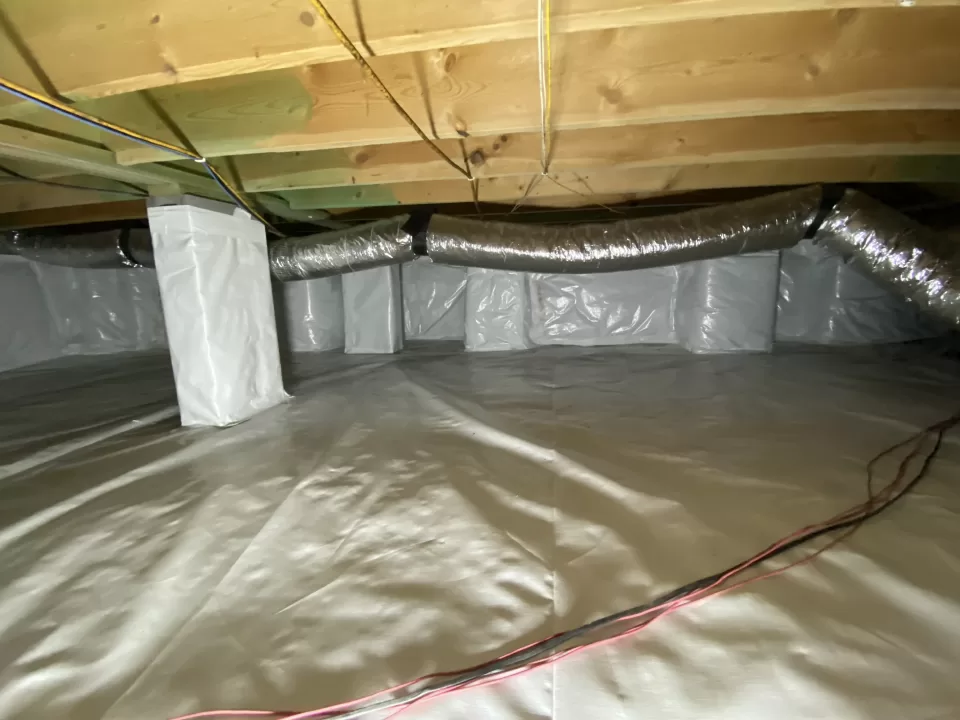
Basement waterproofing is often thought of as a mere home improvement project, something that ensures the space stays dry and usable. While it’s true that waterproofing can transform your basement into a clean and dry area, the science behind it is much more intricate and essential than many homeowners realize.
At its core, basement waterproofing is about protecting your home’s foundation from the relentless force of water. This protection is crucial because a strong, dry foundation is the bedrock of your home’s long-term stability. Let’s explore the untold science behind basement waterproofing, and why it’s so vital to the health of your home.
How Does Basement Waterproofing Prevent Structural Damage to a Home Foundation?
Your home’s foundation is its backbone, providing stability and support for the entire structure. However, water can be an enemy of this very foundation. Over time, moisture can infiltrate cracks and pores in the foundation, leading to a range of structural issues. Basement waterproofing prevents these issues by creating a barrier that keeps moisture at bay. Here’s how waterproofing works to protect your foundation:
- Preventing Water Infiltration: Water naturally gravitates toward the lowest point in a home, which is often the basement. When water seeps through cracks or gaps in the foundation, it can weaken the structural integrity of the home. Waterproofing systems work by sealing the foundation and keeping water from entering the space. This helps prevent mold, rot, and rust from damaging the building materials that support your home.
- Managing Hydrostatic Pressure: Water exerting pressure against your foundation, known as hydrostatic pressure, can cause cracks to widen and walls to bow. Without proper waterproofing, hydrostatic pressure can lead to significant foundation damage. Waterproofing solutions address this pressure by directing water away from the foundation, preventing it from building up and exerting damaging force.
- Protecting Building Materials: The materials that make up your foundation—such as concrete, brick, and mortar—are susceptible to water damage. Prolonged exposure to moisture can weaken these materials, leading to cracks, corrosion, and eventual failure. Basement waterproofing provides a layer of protection, keeping your foundation materials dry and secure.
What Scientific Principles are Involved in Effective Basement Waterproofing?
To fully appreciate the importance of basement waterproofing, it’s crucial to understand the scientific principles at play. There’s more to it than just applying a sealant and calling it a day. Effective waterproofing relies on a combination of principles from physics, hydrodynamics, and material science. Here are a few key concepts that help waterproofing systems work:
- Permeability and Capillarity: Permeability refers to the ability of materials like concrete to allow water to pass through. Concrete is naturally porous, which means water can seep through tiny pores and cracks. Capillarity, or the ability of water to move upward against gravity, is another challenge when it comes to basements.
When groundwater rises, it can travel through capillaries in the concrete, resulting in moisture infiltration. Basement waterproofing systems are designed to reduce both permeability and capillarity by applying barriers that stop water from moving through concrete or up the walls.
- Hydrostatic Pressure: Hydrostatic pressure is one of the most important principles in basement waterproofing. When the ground outside your home becomes saturated with water, the water puts pressure on the foundation. If this pressure is not managed, it can cause foundation cracks and seepage.
Waterproofing systems like French drains, sump pumps, and exterior coatings are designed to direct water away from the foundation, reducing hydrostatic pressure and preventing damage.
- Water Flow and Drainage: Effective waterproofing systems take into account the natural flow of water. Water tends to flow downward and collect at low points, so it’s essential to install drainage systems that guide water away from your foundation.
Systems like exterior drainage pipes, French drains, and gravel trenches allow water to flow freely and prevent it from accumulating near your basement. This ensures that the water is redirected away from the foundation, reducing the chances of seepage.
Why is Water Pressure Management Crucial For Basement Waterproofing?
Water pressure management is perhaps the most critical aspect of basement waterproofing. When water accumulates around your foundation, it exerts pressure on the walls, which can lead to cracks and leakage.
If left unchecked, this pressure can cause serious damage, potentially compromising the structural integrity of the home. Managing this pressure is a multi-faceted process that requires understanding the source of the water and using targeted solutions to alleviate the pressure.
- Hydrostatic Pressure and Its Effects: When the soil around your home becomes saturated with water, it creates hydrostatic pressure that pushes against the foundation walls. This pressure can cause cracks in the foundation and lead to moisture infiltration. Basement waterproofing systems are designed to manage this pressure by directing the water away from the foundation. Techniques such as installing exterior drains, regrading the landscape, and sealing the foundation work together to relieve the pressure and prevent damage.
- The Role of Sump Pumps: Sump pumps are a critical tool in water pressure management. When water collects in the basement, the sump pump removes it from the space, ensuring that water levels don’t rise high enough to cause damage. By continuously removing excess water, sump pumps help to prevent the buildup of hydrostatic pressure, keeping the basement dry and the foundation intact. This is especially important in homes located in areas with high water tables or heavy rainfall.
- Water Diversion Systems: In addition to sump pumps, other water diversion systems like French drains and perimeter drainage systems play a significant role in managing water pressure. These systems guide water away from the foundation, preventing it from accumulating and exerting pressure on the walls. By directing the water to a safe drainage area, such as a storm drain or dry well, the risk of hydrostatic pressure and foundation damage is minimized.
How Does Basement Waterproofing Contribute to Long-term Home Durability?
Basement waterproofing doesn’t just protect your foundation in the short term—it’s a critical component of long-term home durability. A well-maintained basement is essential for the overall structural integrity of your home, and waterproofing plays a key role in ensuring that the building materials remain in good condition for years to come.
- Preventing Mold and Mildew Growth: Moisture in the basement creates the perfect environment for mold and mildew to thrive. Not only are these fungi unsightly, but they can also cause serious health issues. By preventing moisture buildup with waterproofing, you can keep your basement—and your entire home—free from mold growth. This contributes to a healthier indoor environment, which is essential for the long-term well-being of you and your family.
- Protecting HVAC and Electrical Systems: Many homes store HVAC systems, electrical panels, and water heaters in the basement. These systems are sensitive to moisture, and water infiltration can cause corrosion, short-circuiting, or even complete system failure. Basement waterproofing ensures that moisture stays out of these critical systems, helping them operate efficiently and prolonging their lifespan.
- Increasing Property Value: A waterproofed basement can add significant value to your home. Not only does it make the basement usable for additional living space or storage, but it also protects the structural integrity of your home. A dry, well-maintained basement is an attractive feature for potential buyers, making it easier to sell your home if the need arises. Homebuyers are more likely to pay a premium for a property with a well-maintained foundation and waterproofed basement.
- Extending the Life of Your Foundation: Foundations are built to last, but they aren’t invincible. Constant exposure to moisture can weaken the materials that make up your foundation, leading to cracks and instability. Waterproofing your basement helps to protect your foundation from the damaging effects of water, ensuring that it remains strong and functional for decades. This extends the life of your home’s foundation, saving you money on costly repairs in the future.
The science behind basement waterproofing is far more complex than many homeowners realize. It involves principles of hydrodynamics, material science, and physics, all working together to protect the foundation of your home from the destructive power of water.
By managing water pressure, improving drainage, and preventing moisture infiltration, basement waterproofing systems help to keep your foundation dry, secure, and durable.
In the long run, this not only ensures the structural integrity of your home but also contributes to a healthier, more comfortable living environment. So, the next time you consider basement waterproofing, remember that you’re investing in much more than a dry basement—you’re investing in the long-term health and durability of your entire home.
Protect Your Home from the Ground Up with Freedom Crawlspace Services
At Freedom Crawlspace Services, we specialize in protecting your home from the hidden threats lurking beneath it. From crawlspace waterproofing to foundation repairs, our expert team ensures that your home remains safe, dry, and structurally sound for years to come.
Don’t wait for small issues to turn into costly problems—our comprehensive services help prevent moisture damage, mold growth, and foundation issues before they become a concern. Contact us today to schedule a free inspection and take the first step toward safeguarding your home.
